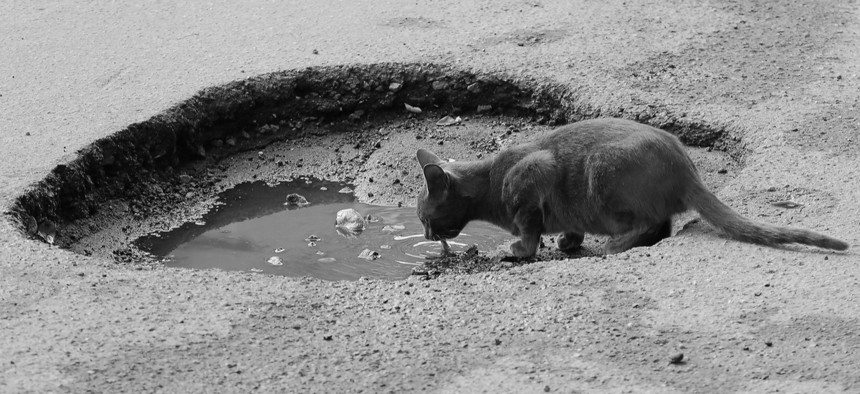City Launches Annual 'Potholepalooza' to Repair Streets

D.C. crews have filled more than 400,000 potholes since the first Potholepalooza in 2009. Shutterstock
Since 2009, the District of Columbia prioritizes and expedites pothole repairs for six weeks each year.
The onset of spring in Washington D.C. means the return of cherry blossoms, the first hints of humidity—and potholes. Lots of potholes.
“Right as the winter is winding down is when potholes are going to be at their worst, and that generally falls within mid-to-late March,” said Jeff Marootian, head of the District Department of Transportation. “This year we had a particularly high volume of rainfall and we also had the regular freeze/thaw cycle of winter, and the combination of those two things did some real damage to our roadways.”
To expedite repairs, DDOT is in the thick of its 10th annual Potholepalooza, a six-week stretch when District officials encourage residents to report potholes and then pledge to fix them within 48 hours (the non-palooza response time is 72 hours). Residents can report potholes by calling 311, filing an online service request or sending a tweet using the hashtag #potholepalooza.
Residents receive a tracking number for their request and updates on the service regardless of how it is made. That work is done in conjunction with regular road maintenance and service projects, which take place concurrently all over the district, Marootian said. On a given day, 10 or more crews are in the field deploying a “full-court press” on incoming requests.
“As we launch we focus more of our crews on filling potholes so we can quickly respond to those service requests, as we expect an increase,” he said. “But we are also proactively servicing all eight wards.”
Potholepalooza officially kicked off on March 25, but pothole service requests were streaming in consistently before that. From Jan. 1 through March 18, DDOT received 7,550 requests, with crews filling more than 5,300 potholes. Last year during that same time period, the department received just 3,295 requests, according to data from the district.
That volume kept pace during the first two weeks of Potholepalooza, Marootian said. From March 25 through April 8, crews closed 2,116 service requests and filled more than 8,300 potholes.
“I can say with some confidence that that’s considerably higher than normal. We don’t normally get 2,000 requests in the span of a couple of weeks,” he said. “It’s a combination of Potholepalooza and just the need for filling, given the record number of potholes.”
Other municipalities have launched similar hole-filling sprees, including Seattle, Richmond, Va. and Georgia’s DeKalb County. D.C.’s is among the most prolific, with more than 400,000 potholes filled since the event first debuted in 2009—and plenty of chatter among visitors and residents, Marootian said.
“We get a lot of inquiries about our Potholepalooza effort,” he said. “The public engagement component has been particularly successful.”
Kate Elizabeth Queram is a Staff Correspondent for Route Fifty and is based in Washington, D.C.
NEXT STORY: With 100 People Per Day Dying in Crashes, Lawmakers Weigh Road Safety Options





